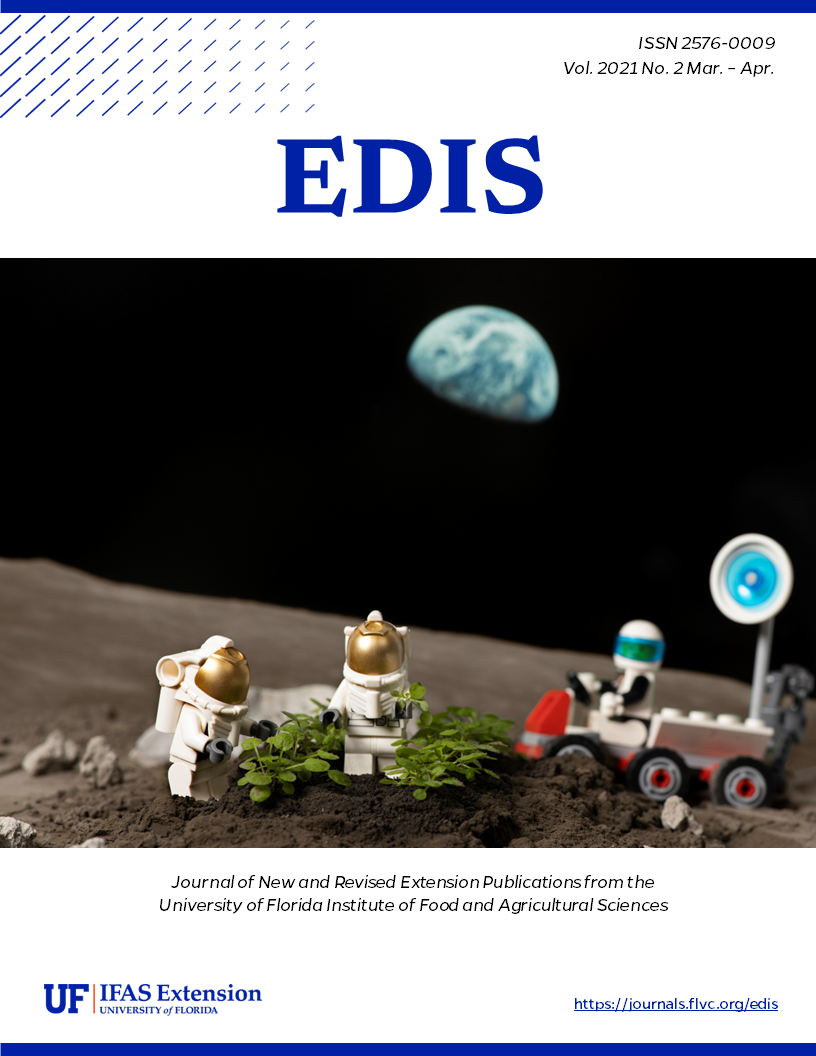Abstract
Fresh water is becoming increasing scarce as the world population grows rapidly. Reclaimed water from alternative sources can be used to help offset the demand for fresh surface water and groundwater in agriculture. To ensure that pathogenic or trace chemical constituents in reclaimed water do not pose a threat to human health and the environment, state and federal governments impose regulations governing reclaimed water use. This fact sheet documents the rules and regulations governing the use of reclaimed water from alternative water sources in Florida agriculture. Target audiences include growers exploring alternative water use for agriculture, non-core professionals, core professionals, and the public.
References
Binh, E., B. Fick, D. Pahl, D. Stoeckel, K. Woods, and G. Wall. 2017. "Geometric Means, Statistical Threshold Values, and Microbial Die-Off Rates." Produce Safety Alliance, Cornell University.
EPA. 2012. "2012 Guidelines for Water Reuse." EPA/600/R-12/618. https://doi.org/10.1016/S1773-035X(12)71700-8
EPA. 2017. Water Recycling and Reuse: The Environmental Benefits. US EPA, Pacific Southwest, Region 9. Available at: https://19january2017snapshot.epa.gov/www3/region9/water/recycling/#p2
FAO. "Water at a Glance: the Relationship between Water, Agriculture, Food Security and Poverty." Available at: http://www.fao.org/3/ap505e/ap505e.pdf
FDA. 2017. "How Did FDA Establish Requirements for Water Quality and Testing of Irrigation Water under the FSMA Final Rule for Produce Safety." Available at: https://www.fda.gov/food/food-safety-modernization-act-fsma/how-did-fda-establish-requirements-water-quality-and-testing-irrigation-water-under-fsma-final-rule
FDEP. 2020a. "Florida's Reuse Activities." Available at: https://floridadep.gov/water/domestic-wastewater/content/floridas-reuse-activities
FDEP. 2020b. "Florida's Reuse Program." Available at: https://floridadep.gov/water/domestic-wastewater/content/floridas-reuse-program
FDEP. 2020c. "2020 Integrated Water Quality Assessment for Florida: Sections 303(d), 305(b), and 314 Report and Listing Update." Available at: https://floridadep.gov/sites/default/files/2020_IR_Master_FINAL%20-%20ADA.pdf
FDEP. 2020d. "2019 Statewide Annual Report on Total Maximum Daily Loads, Basin Management Action Plans, Minimum Flows or Minimum Water Levels, and Recovery or Prevention Strategies." Available at: https://floridadep.gov/dear/water-quality-restoration/content/statewide-annual-report
FDEP. 2019. "Reuse Inventory Database and Annual Report." Available at: https://floridadep.gov/water/domestic-wastewater/content/reuse-inventory-database-and-annual-report
Haering, K., G. Evanylo, B. Benham, and M. Goatley. 2009. "Water Reuse: Using Reclaimed Water for Irrigation." Virginia Cooperative Extension 452(014).
Havelaar, A. H., K. M. Vazquez, Z. Topalcengiz, R. Munoz-Carpena, and M. D. Danyluk. 2017. "Evaluating the U.S. Food Safety Modernization Act Produce Safety Rule Standard for Microbial Quality of Agricultural Water for Growing Produce." J Food Prot. 2017. 1832-1841. https://doi.org/10.4315/0362-028X.JFP-17-122
Hazen and Sawyer. "Economic Feasibility of Reclaimed Water to Users." Available at: https://www.hazenandsawyer.com/work/projects/economic-feasibility-of-reclaimed-water-to-users/
Hochmuth, G., L. Trenholm, R. Rainey, E. Momol, C. Lewis, and B. Niemann. 2016. Maximizing the Benefits of Reclaimed Water for Irrigating the Landscape and Protecting the Environment. SL385. Gainesville: University of Florida Institute of Food and Agricultural Sciences. Available at: https://edis.ifas.ufl.edu/ss587
Lewis, J., and A. L. Wright. 2014. "Reclaimed Water Use for Edible Crop Production in Florida." U.S. Department of Agriculture, UF/IFAS Extension Service.
Martinez, C. J., M. W. Clark, G. S. Toor, G. J. Hochmuth, and L. R. Parsons. 2011. Accounting for the Nutrients in Reclaimed Water Used for Landscape Irrigation. AE479. Gainesville: University of Florida Institute of Food and Agricultural Sciences. https://doi.org/10.32473/edis-ae479-2011
McDaniel, R. L., C. Munster, and J. Nielsen-Gammon. 2017. "Crop and Location Specific Agricultural Drought Quantification." Transactions of the ASABE 60(3). https://doi.org/10.13031/trans.11651
Parsons, L. R., B. Sheikh, R. Holden, and D. W. York. 2010. "Reclaimed Water as an Alternative Water Source for Crop Irrigation." HortScience 45(11). https://doi.org/10.21273/HORTSCI.45.11.1626
Parsons, L. R. 2019. "Agricultural Use of Reclaimed Water in Florida: Food for Thought." Journal of Contemporary Water Research & Education 165(1) 20-27. https://doi.org/10.1111/j.1936-704X.2018.03290.x
Penn, M. R., J. J. Pauer, and J. R. Mihelcic. 2009. "Biochemical Oxygen Demand." Environmental and Ecological Chemistry Vol. II.
Postel, S. L. 2000. "Entering an Era of Water Scarcity: The Challenges Ahead." Ecological Applications 10(4). https://doi.org/10.1890/1051-0761(2000)010[0941:EAEOWS]2.0.CO;2
Takashi, A., F. L. Burton, H. L. Leverenz, R. Tsuchihashi, and G. Tchobanoglous. 2007. "Water Reuse Issues, Technologies, and Applications." New York: Metcalf & Eddy.
Toor, G., and M. Lusk. 2011a. "Reclaimed Water Use in the Landscape: What's in Reclaimed Water and Where Does It Go?" U.S. Department of Agriculture, UF/IFAS Extension Service.
Toor, G., and M. Lusk. 2011b. "Reclaimed Water Use in the Landscape: Frequently Asked Questions about Reclaimed Water" U.S. Department of Agriculture, UF/IFAS Extension Service.
U.S. Department of Energy. "Alternative Water Sources Maps." Available at: https://www.energy.gov/eere/femp/alternative-water-sources-maps
This work is licensed under a Creative Commons Attribution-NonCommercial-NoDerivs 4.0 International (CC BY-NC-ND 4.0) license.

